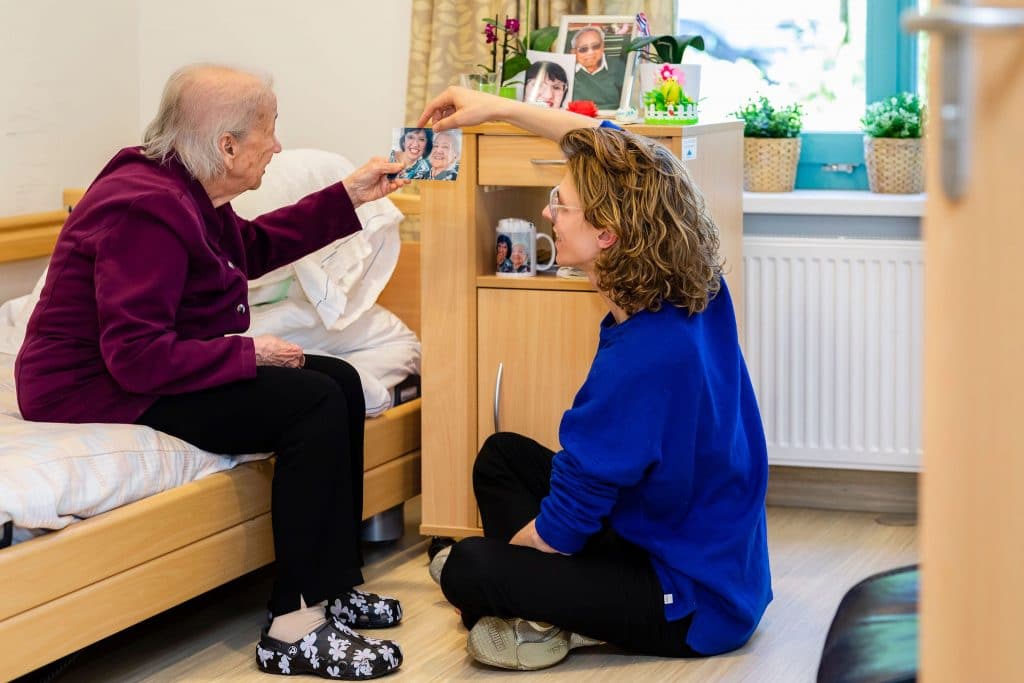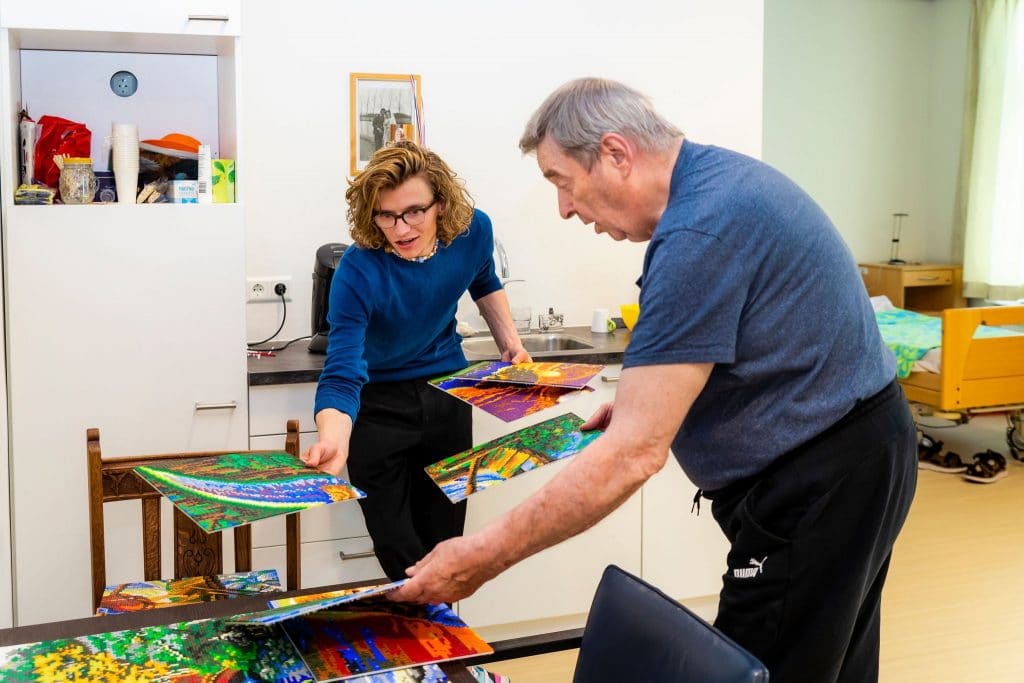Teun Toebes (22) shares kitchen, bathroom and toilet not with fellow students but with people with dementia. He wrote a book about it: Nursing Home. The book came in at number 1 in the Bestseller 60 last week, much to his delight, because Toebes wants to reach as many people as possible with his mission: to change the care of people with a faltering brain. 'It is incomprehensible that we are locked into the last phase of our lives. That no one asks you anymore what you actually want.'
Our life here
'Bye honey, good morning.' Teun Toebes gives roommate Jeanne a big peck on the cheek. The old lady looks at him with twinkling eyes. She has just finished her breakfast, and is sitting at the table chatting with Leny. 'Look, this journalist has come to talk to me about my book,' Toebes says as he puts his arm around her shoulder and presses her against him for a moment. 'You know that, don't you, that I wrote a book? You are also in it. It's about our life here.' Leny nods. 'I'd like to read it.'

The 22-year-old Zorgethics and Policy student walks down the corridor of the residential care home in Utrecht where three homes, each with six to eight residents, are connected. It is ten o'clock in the morning, and one of the care workers is helping residents Tineke and Elly with their sandwiches. Apart from the system ceiling, large door and bright lighting, Toebes' room could almost be a normal student room. Almost, because his housemates are not students but people with dementia and he lives in the closed ward of a nursing home.
He wrote a book about his experiences during the first year, Nursing Home. In it, he tells what he learns from his housemates with a faltering brain, what life in a nursing home is like and, above all, how things can and should be done differently. It is a cry from the heart with which he wants to change the world of care and our view of dementia. Teun Toebes is someone with a mission.
'I started living in a nursing home because I was concerned about how we treat people with dementia in the Netherlands,' Toebes says while making coffee in his room. 'A few years ago, my grandmother's youngest sister was admitted to the nursing home where I was working at the time. Then I discovered that people with dementia no longer get a voice; they are never asked what they think is important. At the end of their lives, all self-determination and freedom is taken away from them - the core of our humanity.'
Gulping for a moment
The only way to understand what it is like to live in a nursing home and to be able to change it was to go and live there yourself, Toebes decided. His mother had to swallow when her son came up with the plan last year. 'She had expected me to visit her in a nursing home one day, not the other way around. When I tell people I live in a nursing home, they look as if they see water burning. That says everything about the way we have grown apart as a society.'
The image many people have of dementia is much blacker than reality, Toebes now knows from experience. He genuinely enjoys living in Voorhoeve. Sure, sometimes a housemate dies, but on the other hand, the togetherness is intense, and disarming. 'This morning, my opposite neighbour was standing in pyjamas in the corridor when I came out of the shower with wet hair. "I just woke up," I said, "'You too?'" She nodded and asked, "Do you live here too?" The contact is special every time. I have a strong bond with many housemates.'
No distinction
Although most people prefer to avoid the subject of dementia, it is popular disease number one and now affects one in five Dutch people. 'So everyone has to deal with it, either you get it yourself or someone close to you gets demented. You can be CEO but dementia makes no distinction. We have to finally start realising that it is about all of us. If we don't change, we'll be like this ourselves later.'

Toebes stands at the window and points outside, to the outside world: 'What I find incomprehensible is that people with dementia are locked up. They live in closed wards which completely cuts them off from society. I look out on a beautiful garden and a green fence. I can't even SEE the outside world behind it.'
For fear of what might happen, residents are not allowed to just go outside; permission is needed from the legal representative or a caregiver must be present. 'Everything is focused on safety and avoiding any risk - just imagine someone walking into the street, just imagine something happening. With every incident, policies are further tightened. Nursing care has become a security service. Those with a faltering brain are the victims of this because they are excluded from society and no longer considered equal.'
Resident as all others
Teun is the only resident with the code to the front door, but also a housemate like any other. He shares the bathroom and toilet, in the evening they eat together. 'I only know about my housemates what they tell me. How old they are, what form of dementia they have, what their clinical pictures are - no idea. This is nice because that way they remain my housemates rather than patients. Muriëlle gives me advice in love, with Ad I watch football. By the way, he prefers to talk about beautiful women.'
Speaking of amorous relationships, whether he can bring a date to his room is usually one of the first questions he is asked. Like the other residents, Toebes is allowed to bring friends or loved ones home as normal. 'When I bring someone I always introduce them to my housemates. Muriëlle then often tells me afterwards in detail what she thought of that person.'
Always young
The student pokes his head around the corner at his neighbour who is busy making postcards. In her room is a piano: 'Playing is no longer possible, my fingers are too stiff.' She taps her index finger against her temple. 'But the music is still in my head.' 'Ordinary songs too?' jokes Toebes. 'Sometimes, yes,' his neighbour laughs. Toebes gives her a wink. 'Yes, we always stay young.'
Photos hang on the colourful walls of the living room and kitchen. The front door features a beautiful cityscape - a tad ironic, since residents cannot freely go outside. On many levels, Toebes thinks things could be more human. 'Why, for instance, do residents sleep in a hospital bed instead of their own? Why fake flowers? Why is there a toy dog in the window sill while Tineke was not allowed to take her dog with her when she moved here? Why do residents have a different toilet to visitors and nursing staff, as if there were two categories of people? This deprives you of your dignity unnecessarily in the last phase of your life.'
It is not down to the good care and intentions of the staff, says Toebes, they do more than their best. But caregivers are also stuck in this system and hardly have room to work from their hearts and feelings because of all the rules and protocols. 'We as a society have created this system, therefore we are the only ones who can change it.'
Feeling and listening
For people with dementia, this final phase can be so much more than living from meal to meal, waiting for death. According to Toebes, people underestimate what they can still do and want. If someone is no longer able to seek contact on their own, it does not mean they do not need it. Many people mistakenly think there is no point in doing something fun with people with dementia, 'because they will forget that anyway.' Toebes: 'That hurts me so much. Because we are so focused on rationality, we exclude a large group of people based on what we see as a 'disability'. But even people with a faltering brain have a rich emotional life. Indeed, my housemates have taught me to feel and listen.'

How long he will continue to live in his 'Nursing Home', Teun does not know. 'I don't have an end date, like people with dementia don't have one. This is not a temporary project, but a way of life with a serious message.'
A message that excites more and more people, Toebes notes to his delight. Together with housemates Ad and Muriëlle, for instance, he was a guest on the talk show Op1: 'The first time nursing home residents were allowed to say something about corona themselves'. On social media like Instagram and LinkedIn, he now has quite a following.
Meanwhile, his family and friends are also completely converted. Toebes does everything he can to bring life inside and outside the care facility into contact with each other as much as possible. A duty our society should also take on, he thinks, because that is what keeps people with dementia involved. 'In the summer, I had set up my caravan here in the garden and we often sat with my mother drinking beers and talking until half past midnight. It was fantastic. That's life.'
Nursing Home. What I learn from my housemates with dementia appeared at De Arbeiderspers, €20.
